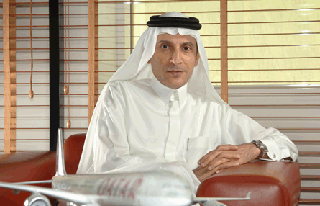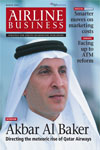By: Akbar Al Baker |
|  |
|---|
Airlines worldwide continue to compete on the three fundamentals of cost, network, and product. However, in all of these areas, both the way airlines compete and the marketplace in which they compete has changed dramatically.
No longer is an international trip solely seen as one across the Atlantic or the occasional business trip to Asia, or the rare governmental trip to the developing world. Today, most of the world is flying because it is developed or rapidly developing and is affordable for everybody.
The variety of where people travel and for what purpose has grown immensely. With this growth, airlines have emerged to meet local taste and global ambitions. Transport has become both a need and a want, and is critical to human interaction and development and increasing life balance.
With the emergence of many more airlines, competition has created further pressure on the cost of production and quality of service. In the past 25 years, passengers once again are being given the ability to relax on aircraft in more comfortable and ergonomic seats. It is even possible to sleep away the flight in flatbeds and on flights that now stay in the air for more than 14 hours at a stretch.
The improvements in in-flight entertainment and access to information over the internet has also made the in-flight experience much more comfortable and productive. Before take-off, customers can now decide to access lounges that offer both comfort and utility.
However, at the other end of the spectrum, airlines have emerged that are solely focused on cost. These low-cost carriers strip away every conceivable extra cent of cost to reduce the price and stimulate the amount of travel undertaken. In a few rare instances, airlines such as my own have found how to balance the cost and products offered to passengers to fill an increasing niche for the breadth of network, quality product and a superior cost base.
These changes and different emerging airline models would not be possible if the world's air transport regulations had not changed, mainly through the economic deregulation of air transport in local and regional markets, and later on the liberalisation of international aviation markets. Innovation and creativity in the airline business was, inter-alia, the result of the airline freedoms in the fields of market entry, routes and price setting.
The liberalisation of air transport is critical to everyone's success. Governments worldwide must further liberalise the air transport industry on bilateral, regional and multilateral levels to facilitate the most efficient airline business models.
As well as that, trust-based relationships between governments and airlines are critical to the industry's growth and profitability. Governments need to understand the airline business environment and the social and economic effects of air transport. Consultation with airlines before issuing new regulations would lead to the greater good of all. The recent losses during the Icelandic volcanic eruption are living examples. Governments must also critically assess that air travel is not simply a luxury for the world's elite but a critical piece of infrastructure to foster trade, development, the movement of people to jobs, and human understanding, and is an indispensable element to reach the millennium's goals.
However, with continued growth, airlines must continue to play their part in a continued commitment for corporate social responsibility in terms of environmental impact and good corporate citizenship. The resolution taken during the General Assembly of ICAO in Montreal last October to commit the ICAO member states to reduce carbon emissions by 2% each year until 2050 is really a great achievement. Airlines will play a big role in reaching this target. The airlines that are willing to invest in modern fuel-efficient aircraft and alternative fuels need to be recognised as contributing even more to our global infrastructure.
When Akbar Al Baker, the driving force behind Qatar Airways's growth, appears on the cover in 2006 its $1bn revenues ranked it 100th in the world. By 2009 it ranked 35th, with $3.5bn in revenues
"I'm a businessman and a businessman will always be successful when he develops a relationship with people. We have a very close relationship with Emirates and Etihad, both on an airline and at a chief executive level," he says. "I'm a big believer in sharing business with other people and there is enough to go round for Emirates, for us, for Etihad and for Gulf Air. We should not get into a pissing dispute with each other."
COVER STORY: MARCH 2006
| FROM THE ARCHIVES When Akbar Al Baker, the driving force behind Qatar Airways's growth, appears on the cover in 2006 its $1bn revenues ranked it 100th in the world. By 2009 it ranked 35th, with $3.5bn in revenues
|
Source: Airline Business
























